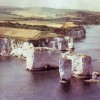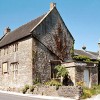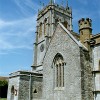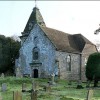For most people, it may come as a surprise to learn that William Wordsworth passed two years of his life in a Dorset manor, for he is inexorably associated with the Lake District. Indeed, the poet was a native, having been born in Cockermouth, Cumbria in 1770, the son of a solicitor. However, between September 1795 and June 1797 Wordsworth tenanted Racedown, a country house standing at the foot of Pilsdon Pen, an Iron Age hill fort in the extreme west of Dorset.
The circumstances leading to William’s occupation of Racedown owe much to the poet’s embrace of and involvement in radicalism. Through earlier sympathies he fell in with Francis Wrangham a Yorkshire-born curate of Cobham, Surrey and Basil Montagu, said to have been the illegitimate son of the 4th Earl of Sandwich. These men were engaged as tutors to John and Azariah Pinney, sons of John Praetor Pinney, an affluent Bristol Merchant member of the Bristol West Indies Trading Company.
Some years before, John P Pinney had built Racedown for his elder son John, either to occupy himself or to rent out. John Jr opted for the latter alternative and offered the home to Wordsworth fully furnished, yet rent-free. At this time the poet’s fortunes in London were severely depressed, but tenancy of Racedown seemed to hold the prospect of a literally creative diversion for himself, in company with his sister Dorothy. William had also recently inherited a legacy of £900, so in the autumn of 1795 the Wordsworths moved in with Montagu’s son – also called Basil – who they had to raise and educate for a fee of £50 per annum. The three had to make the 50-mile journey from Pinney’s Bristol home, where they had been staying, through Somerset and Dorset – a journey that at that time took almost all day.
However, the Wordsworths were not taken with the country house, which they considered an affront to their aesthetic senses. Pinney had built Racedown as an austere edifice of dark red brick with an “ugly and forbidding exterior.” A grey slate roof pitched at an unusually high angle tops its three storeys, and the squat, solid appearance is further accentuated by a large chimney block at each end. Nor is there enough area of window to relieve or break up the continuity of the brickwork. Yet there are, or were, two outside privies, a brew-house, a washhouse, a coach-house and a four-horse stable. The interior of the house however, better met the Wordsworth’s expectations, having an Axminster-carpeted dining room, a breakfast room and library, and four bedrooms on the first and second floors.
The residence was built just off a bend in a narrow lane under the lee of a steep hill rising above the valley of the river Synderford, with a view towards Taunton Deane. The nearest villages were Blackdown, where unsociable cousins of the Pinneys lived, and Birdsmoorgate, neither of which at the time consisted of more than two or three flint cottages.
Two weeks after moving in, William and Dorothy secured the services of a servant called Peggy Marsh, who Dorothy described as “one of the nicest girls I ever saw.” She was joined by Joseph Gill, a cousin of the Pinneys who served as both house and estate manager and gardener, and an unknown washerwoman who came just once a month for a wage of nine pence. This staff of three, apart from the occasional encounter with peasantry in the lane, were the only other people the Wordsworths had contact with. William could not afford a London paper, the only paper he was able to obtain being the provincial Weekly Entertainer. The isolation the 25-year-old poet felt deeply affected him and compounded his chronic insolvency. Nor could he take part in the radical events then unfolding upon the world stage or even read about them.
But Wordsworth could find solace in his well-known passion for hill walking. It was not long before he was striding up Pilsdon Pen behind the house, where he found the summit – the prehistoric enclose, at 980 feet the highest point in Dorset – commanded breathtaking views into Somerset and around Lyme Bay from Lyme to as far west as Torbay. But Wordsworth also loved the sea, and would sometimes walk from Racedown to Lyme, saying that he could hear the sea from three miles away. One memorable occasion for William was seeing the great West Indies fleet sailing by “in all its glory” only to be dashed to pieces on the Chesil during a storm. Coincidentally, though he couldn’t have known it at the time, his sea captain brother John was to perish when, as master of the Earl of Abergavenny, that ship was wrecked not far to the east in 1805.
But these ramblings were pleasant interludes during a stay at a home that was otherwise a miserable affair. Some alleviation from the gloom was provided when John and Azariah came to stay throughout February 1796 and joined William in hare coursing. But once they had left the poet suffered virtual writer’s block, only penning his Argument for Suicide. He broke off for a stay in London from June 1st to July 9th 1796 where his spirits were revived in the company of fellow radicals. Back at Racedown, Wordsworth threw himself into work on the theme of guilt, crime and punishment in his verse drama The Borderers.
Then that November Mary Hutchinson, whom William had first met at Penrith some years earlier, came for a six-month stay at Racedown. While undertaking the work of transcribing her friend’s poems a bond of love blossomed; the couple would eventually marry in 1802.
For Wordworth the Dorset peasantry now came to embody all or most of the virtues he had noticed long ago in their Cumbrian counterparts: courage, endurance, faith, compassion and love. Then it seemed that the country around Racedown burst into beauty.
Mary’s stay ended on June 5th 1797; on the 30th, William and Dorothy were picked up by William’s friend Samuel Taylor Coleridge for the 40-mile journey to Coleridge’s cottage at Nether Stowey. As they drew away from the house brother and sister may have glanced back, but they would never see Racedown or cross its threshold again. Soon after, Wordsworth left to spend several years with radicals on the continent. On his return to England he made a new home with Mary and Dorothy in a cottage at Grasmere by Derwent Water. In 1843 Wordsworth succeeded Robert Southey as Poet Laureate, dying aged 80 in 1850. Dorothy died in 1855; Mary in 1859.



